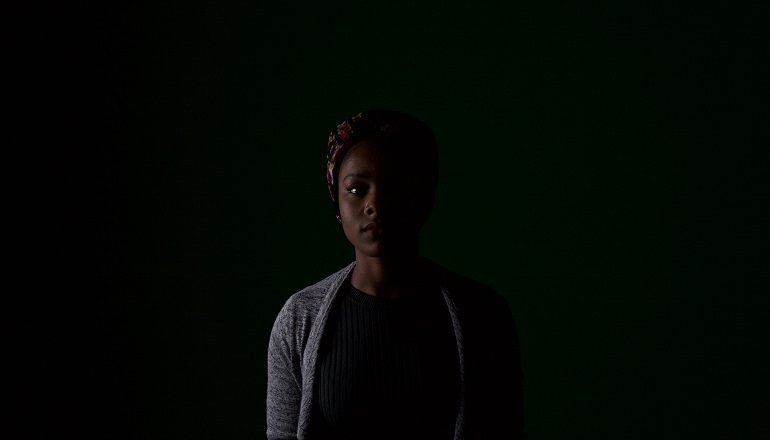Cynthia Siyovmo was 10 when civil war broke out in her native country of Burundi. She lived through seven nightmarish years as she lost her father, then her mother, then her brother to the horrific conflict. The daughter of a Hutu father and Tutsi mother, Cynthia “had no one and belonged nowhere.” When she was 17, and barely surviving from day to day, a stranger approached her with a fake passport and a plane ticket to Canada, to seek asylum. On September 4, Cynthia was detained in the U.S., with an uncertain future that lay at the mercy of fate— and the kindness of an incredible series of strangers.
In her West Peachtree Street law office, Sue Colussy, director of immigration services at Catholic Social Services, got a phone call. “I’ve got this kid who’s about to age out,” an Atlanta-based INS agent told her. Colussy knew that Cynthia’s most pressing problem had been her unlawful arrival, but added to that was a ticking clock. In two weeks, Cynthia would turn 18—adulthood in the eyes of the court. Too old for a group home, too old for foster care. Without a sponsor or asylum, which would take months to secure, if it could be secured at all, Cynthia, who, by all evidence, had never done anything wrong, would be reintroduced— indefinitely— to a necessary ugliness of the immigration flow: adult lockup. Jail.
As Colussy got to work on the asylum application, Catholic Social Services e-mailed hundreds of contacts, looking for a refugee sponsor for 17-year-old Cynthia.
In a borrowed office near Chastain Park, Reid Preston Mizell sat at her computer, absorbed in a struggle to come up with a business plan for what one day would be Tula Communications. She and Robert would soon celebrate their twenty-third wedding anniversary. The youngest of their three children was 15. Now seemed like a good time, and yet the worst time, to be thinking of starting her own firm— Robert, an architect, had decided to go out on his own, too. Their friends thought they were nuts to make such huge leaps at the same time.
[Expert Audio: Parenting an Older Child]
Reid had made bold moves before, though. In the mid-eighties, despite an abundance of private schools, she cofounded Atlanta International School, a K12 International Baccalaureate academy dedicated to bilingual education, whole-child development, and diversity. She was a brand-new mother at the time, but already knew she wanted her children to grow up open to other cultures and to all the world had to offer.
As she stared at her screen, an e-mail appeared from a friend who volunteered at Catholic Social Services.
“Reid,” the note said, “you speak French, don’t you?”
“Oh, my God, she’s Sara’s age,” Reid thought, as she read the e-mail about Cynthia. She picked up the phone and called an administrator at Atlanta International School and asked, “What can we do?” Admissions offered to bring Cynthia into AIS on full scholarship.
Driving home, Reid thought, “OK, the scholarship is a huge help, but who’s going to sponsor her?” Then, sitting at a red light, she started laughing. The clarity of the moment struck her.
[Refugee Adoption: A Whole New World for Our Daughters]
The Mizells had room in their home. Most of them spoke French. Of all the schools in the metro Atlanta area, Reid had helped found the one that would best serve someone like Cynthia. Sara was her age— they could be classmates. Reid thought, “Obviously, I’m part of somebody’s plan here.”
At home, she called a family meeting to talk about offering this young woman a home. Could it work? They had the space, but would a teenager from Burundi feel comfortable with a white family in Buckhead, Georgia? Would she have emotional problems, given all she had been through? What had she been through?
“If we do this, the burden will be on you,” Reid told her daughter, Sara, who was only weeks into her senior year. “You’re her age. You’re going to have to go to school with her. This is going to intrude on your life the most on a day-to-day basis.”
“I understand that,” Sara said.
“Let’s go meet her,” Reid said. “If you feel you don’t want to do it, no judgment. We’ll just say no.”
Reid and Sara went to meet Cynthia 24 days after she arrived in the U.S. and one day before her eighteenth birthday. When the INS agent introduced Cynthia to the Mizells, Cynthia began crying, and then Reid began crying, and then the INS agent began crying, and then Sara rolled her eyes and took Cynthia by the hand.
[Online Adoption Resources for Prospective Parents]
“Bon alors, on va parler,” she said. Come on, lets go talk.
Sitting on a garden bench, Sara explained, in French, about her family and their house and her school— that many students there were learning to speak English and that Cynthia could, too. Merci, Cynthia kept saying, and je ne le crois pas— I can’t believe it.
When they walked back over to Reid and the agent, Sara whispered to her mother, “Let’s do this.”
Reid looked at the agent and said, “OK.”
OK. One word and everything changed.
Or was it more than one word?
Look, I’ve got this kid . . .
Reid, you speak French, don’t you?
Lets do this.
OK.
The e-mail from Catholic Social Services had gone out to hundreds, who had forwarded it to hundreds. Out of the silence, one person responded, like an answer to an SOS.
This piece was adapted from a longer article by the same title, which won the 2008 National Magazine Award for feature writing. Excerpted with permission. Read the full article at atlantamagazine.com.



